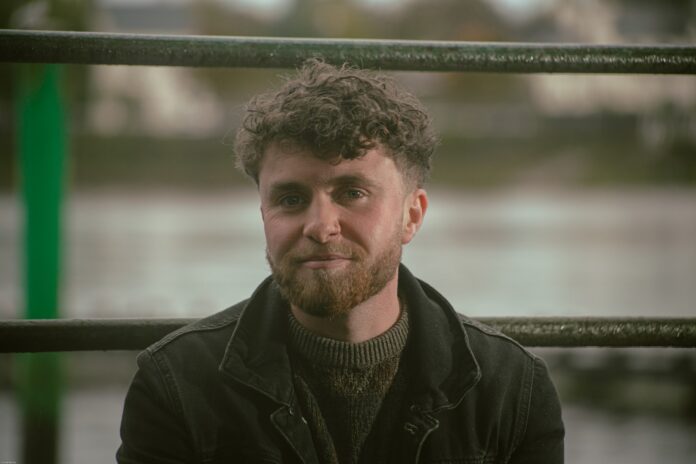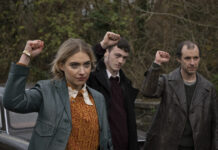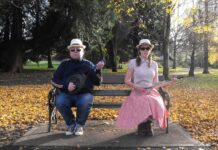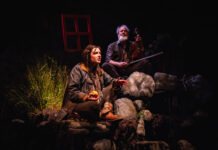I find myself once again in Sodalicious Café but this time I’m not waiting for anyone. In fact I’m the one who is late. Local poet and writer William Keohane sits waiting for me. A sudden downpour of November Limerick rain delayed me, but thankfully William is kind and patient.
With a poet for a grandmother, it’s no wonder William found himself taking a creative path.
Maureen Keohane would read him stories and write poetry, one of which he keeps in his wallet. In school, a weekly creative writing group, run by his chemistry teacher, gave William a community.
“We would meet at lunchtime and just all write together,” he recalls.
The rhythm of poetry and language captivated him. When he was seventeen he started writing a novel for National Novel Writing Month (NaNoWriMo), a month long daily writing challenge taken by industrious, brave writers.
“I got to 30,000 words and left it. I think it’s still somewhere on a USB,” he says modestly. I ask him if he would ever return to it but he doesn’t imagine he will.
“It told the story of a kid living in an isolated house up on a hill and then they venture into the city for the first time, so there’s definitely something metaphorical there,” William laughs his infectious laugh.
“It was a nice escape. I think writing begins as an escape or just as a way to explore the self.”
Despite these beginnings, it was psychology and sociology that William chose to study in UL. But in his spare time he was involved in Stanzas, a dynamic and vibrant poetry movement that hosted readings around the city. They now only run occasional events, but their poetry installation from Limerick’s 2020 bid still remains as a beacon in the city in crisp bold letters spelling out “It will rise with the moon” above the river just by Sarsfield Bridge.
The first Stanzas reading William read at was in Cellar Door, the former basement café on Foxes Bow, a sadly missed stalwart. He remembers a young Denise Chaila performing her poetry and wowing the audience.
William had some of his work published shortly after. This caught the attention of writer Joseph O’Connor, who was the course director of the MA in Creative Writing at UL.
“I couldn’t think my way into a writing career because I could only see myself as someone who wrote the occasional poem,” William confessed.
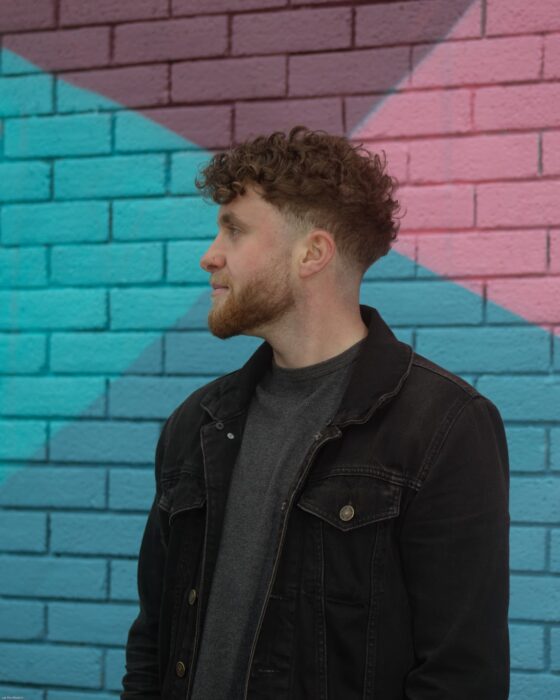
He was on a different path at that time. He had done a MA in psychology, had some work as an assistant psychologist, and even started a PhD.
During this time, however, he found himself at a pivotal point in his personal life. The pandemic hitting caused him to reassess his academic direction.
“When March 2020 rolled around I had just come from surgery and had just started testosterone. I was starting this PHD and I realised, this is too much all at once and is this really I what I want?”
He applied for and got a place on the MA in Creative Writing in UL, Joseph O’Connor even ended up supervising William’s dissertation.
“It was the best decision I ever made. It gave me the ability to adequately assess my writing. It was all online, but the class managed to foster connections and met up for socially distanced coffees in the park when we could.”
William found the online aspect helpful as he was navigating his transition. His classmates were “just looking at this man on the screen”, he explains.
“I didn’t have any name change issues. Everyone would know me immediately as William Keohane. I could choose whether or not to disclose that I was trans.”
The online space is not necessarily an easier option for the trans community, William explains, saying that “for some trans people, issues of dysphoria arise if you’re constantly looking at your own face”.
Having completed his degree, William was about to start a job when he received the Literature Bursary Award from The Arts Council.
He used this as income to pay himself to write full time. The gift of time to think and create allowed William the chance to work on his own practice of poetry and essays but also the chance to travel and embrace opportunities beyond Limerick.
“Connecting to people in the industry and having conversations lead me to different places. People I met sent me on opportunities.”
His first published essay, Cratloe Wood Lake, written about his grandmother, was published in Cork literary journal Banshee. On the back of this, he was contacted by GQ magazine and commissioned to write a piece about his relationship to his face, which was published earlier this year in July 2022.
Around this stage in his journey, William was looking for a trans group in Limerick but couldn’t find anything. He was travelling to Dublin regularly to link in with supports. Looking to fill that gap in the city, he took it upon himself to set up TLC: Trans Limerick Community.
In May 2021 William organised the first monthly meeting online. Only expecting a few people, he was surprised that over twenty attended. The numbers have remained consistent ever since.
What became apparent in these meetings was the high interest in creativity and writing within the group. Honouring the creative vision of his secondary school chemistry teacher, William set up the Trans Writing Group.
The group met online to write together, leaving their screens on while they wrote in a show of mutual support for one another. William was keen to showcase some of the work being created. In July 2022, as part of Limerick Pride Festival, the group had a night of readings in Ormston House – the home of TLC and the Cultural Resource Centre where William is one of the artists in residence.
The event was limited to fifty. It sold out almost immediately.
He was nervous of ensuring the safety of the writers as, just a few days before, hostile crowds had gathered outside a bookshop in Mayo where drag queens were reading children stories. While drag is about performance, and isn’t in any way the same as being trans, the roots of this kind of hatred and violence stem from the same fears and phobias.
Thankfully the Trans Writing Showcase was a resounding hit and a night of glorious creativity, positivity and – happily – I was one of the lucky members of the audience.
William explains that from a young age he always knew who he was. His parents were supportive and let him wear the boy’s uniform to primary school, but when it came to secondary school he chose not to do this – even though both sets of uniforms were available.
“I just wanted to get through school. Survive really,” he says.
William, who is now 26, explains that the recent School Climate Survey by Belong To highlights how difficult things still are for LGBTQ+ kids in school, even in 2022 post-Marriage Equality Ireland.
He did not feel this was something he could face up to in school and wondered could he even survive transitioning.
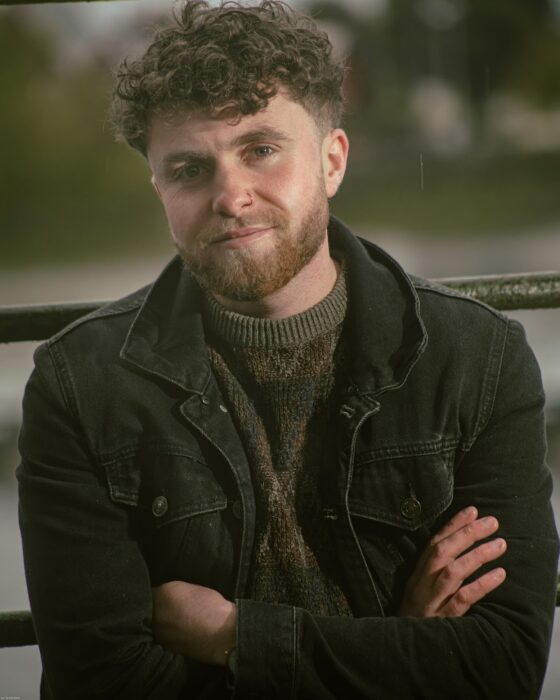
When he was 19, he met an adult trans person, who he remains good friends with. He recalls the impact that friendship and that trans visibility had on him: “It makes it believable, it makes it possible. I can live like that.”
Part of William’s work as a writer is giving writing workshops in secondary schools and youth groups.
“I was recently in Mayo and really wanted to reach out to LGBTQ+ youth groups. We had a workshop with groups from four different areas. There were two 13-year-old trans boys who had never met a trans adult. It felt like closing a circle because I didn’t have that as a young kid.
“If I had seen a trans adult, I might have realised that my life was possible much younger.”
When giving the workshops in school class groups, it’s a slightly different set up, but William still feels the significance of the work.
“I’m introduced as a writer and a trans man. It’s just a descriptor of who I am. I am happy with either it being included or not.
“Visibility is so important but it can also be a trap and endangering to some members of the trans community.
“I’m in a place of privilege where I can walk into a space and not be at risk, so isn’t it best if I do it?”
There are times, William admits, where he just wants to be himself and not be overly identifying in any way.
“I just want to live my life.” he gently laughs.
William’s work, Boxing Day, a series of poems that explore his transition as a form of a conversation between his present and past self, was developed during his residency in Ormston House. It’s a very beautiful, raw, and honest piece of work where William is very open and vulnerable about his struggles within his transition.
The stunning performance piece, which I recently had the privilege of seeing in Belltable, has been presented in Limerick, Dublin, and Waterford.
Despite his success, William does highlight a concern he has around his own work.
“I worry that my work is seen as a singular trans narrative, when there isn’t one. Everybody in our writing group has a different story and creates very different work and the only thing we have in common is the fact that we’re trans.”
He is now working on a variety of poetry and essays that are due for publication. He explains, however, that there can be an expectation that trans artists must pour all of their own selves into their work, that they must bare their souls and share every intimate detail of their lives in order to foster empathy and gain support.
“A lot of trans writers just want to write fiction or horror or comedy and have the freedom and the flexibility to do that.”
He pauses for a moment and smilingly adds “Maybe the future is fiction.”


